"The people of Guatemala and their volcanic country with its romantic cities, markets, and farms are shown." See and Hear, March 1947, 46.
"Film focuses on women with short skirts walking inside or outside, shopping, with baby carriages or shopping carts, sitting down or walking down stairs" Archives of Ontario.
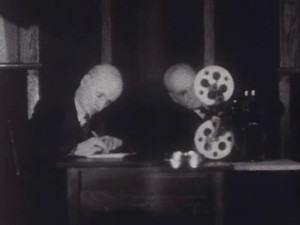
"Amateur production. A man, Dent Harrison, falls asleep and dreams that the R-100 sails for North America from its base in England. Various long shots of the airship under way. After the mooring procedure is completed, S/L R.S. Booth, S/L E.L. Johnson, Capt. G.F. Meager and other members of the crew meet with the welcoming party led by Minister of National Defence, J.L. Ralston. G/C Stedman, G.J. Desbarats, Maj. Gen. McNaughton and officers of the U.S. Navy are also in attendance. Several civilians are also in the party. Harrison's "clone" visits with his "brother". Cut back to the airship and shots of repairs to damage sustained in a thunder storm over Trois-Rivières. Visitors climb into the airship in a high wind. The R-100 is shown leaving on its Canadian flight. View of the shadow of the ship on the ground and several shots from various distances, notably from Windrift, the summer home of the Harrisons at Lakeside, Québec. Aerials of Niagara Falls, Welland Canal, Toronto, a lake steamer, Kingston, Queen's University, Kingston Penitentiary, the Thousand Islands, with cuts inside the airship's gondola, with crew men silhouetted against bright windows. More aerial shots of Cornwall, the shadow of the R-100 on Montreal, Côte-St-Luc and Verdun. Various ground to air long shots and closer views of the R-100 in flight, of the airship moored to its mast at St-Hubert air base. Sequences on Dent Harrison talking to his "clone" as he edits his footage, projects it into the lens of the camera. The two have lunch and the clone departs. Shots of the R-100 leaving as seen fromn directly underneath. Cut back to Harrison waking up from his dream." (LAC description)
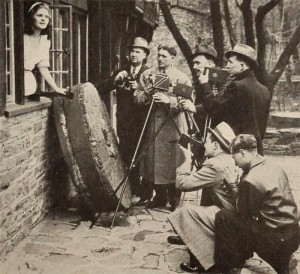
An amateur club adaptation of Alfred Noyes poem The Highwayman. A "ballad of love and murder" that "emphasizes atmosphere and explores the sympathetic relationship between natural and dramatic elements". The poem "narrates the highwayman's secret meeting with his love Bess, a landlord's daughter, their discovery by a group of soldiers who hold Bess as bait for the highwayman, and her grisly death by musket...Throughout the poem the natural settings play an important role in amplifying its supernatural and dramatic content...Like its use of natural settings, a natural acting style was employed to set this film adaptation apart from its source materials and its rival media. Finally, the film's use of double exposure in order to create the impression of ghostliness in the tragic couple's final reunion marks a particularly cinematic solution to the problem of visual representation" Tepperman, 244-245. Title credits name Tedd Briggs as the director and Alan Moorhouse as the Producer, "under the auspices of the Toronto Amateur Movie Club".
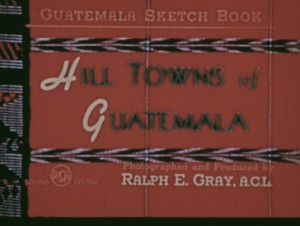
"A narrated travelogue addressed to viewers in the U.S. shows life in several small towns surrounding Lake Atitlan, Guatemala. Shows rope making from sisal hemp and traditional textile weaving. Concludes with a visits to the outdoor markets in Santiago Atitlan and Chichicastenango" Indiana University Libraries Moving Image Archive.
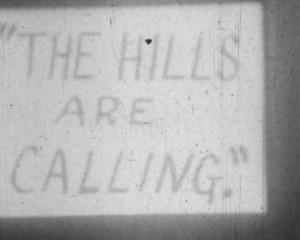
"Amateur filmmaker, cinema historian and railway engineer H.A.V. Bulleid employs a grim sense of humour to show the lengths to which a young man will go to make money. Out walking in the fields, a boy comes across a steep drop, and sitting on the clifftop, he hatches a foolproof money making scheme. Advertising for people to 'Come and see a 'death leap'', he charges 6d entry. As the crowd assembles on the clifftop, an unwitting patron is urged to move backwards, stumbling over the edge. Happy with the success of his scheme, the boy sits in the grass, clutching the money in his pocket" (EAFA Database).
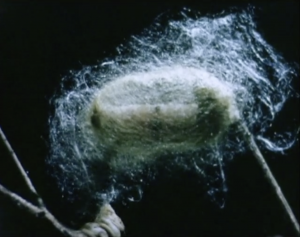
Documental sobre la metamorfosis del gusano de seda desde su nacimiento hasta su muerte, pasando por todos los procesos morfológicos.
A documentary about the silk worm metamorphosis, from its birth to its death, showing al morphologic processes.
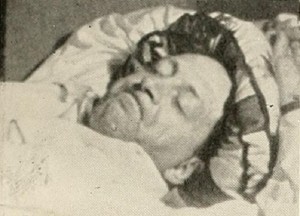
"A clever little domestic story, unpretentious but told in a good cinematic style, comes from the camera of J. Owen Campbell, in His Off Day. Here are recounted the difficulties experienced by the father of a family in his endeavor to relax on his day off. Constantly frustrated in his attempts, he finally seeks refuge in the family car, with results which provide an amusing surprise ending, notably clever in treatment. Technically, the outstanding feature of this film is the handling and lighting of the interior shots, which are uniformly good, with the exception of one or two of them. Mr. Campbell has demonstrated in this film that a simple story, enacted in familiar settings by members of one's own family, offers the most usable material for the average movie maker's indoor efforts. It is for such an outstanding embodiment of this principle that the producer of His Off Day is especially to be commended." Movie Makers, Dec. 1940,602-603.
"an original story based upon a young doctor’s fall and consequent rise to fame… requires a great deal of careful handling owing to the fact that the greater part of the story is interior work" (HMHT 1934: 325-6).
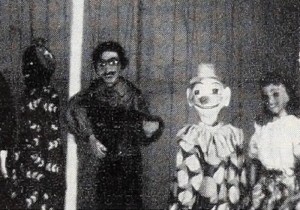
"Although Hobby Show consists of little more than a walk through an exhibition hall, where the talented hobbyists of Long Beach, Calif., have exhibited their crafts and collections, Leonard E. Graham and his wife, Velma, have succeeded in making the experience a constantly interesting one. Each of the exhibits is fascinating in itself, and the Grahams have done an admirable job of overcoming the obstacles of lighting, shooting through glass (which they had to do for some detailed studies of miniatures) and filming under generally difficult conditions. Technically, the film is top drawer. The musical score for the picture of old player-piano music was an inspiration and a delight." Movie Makers, Dec. 1951, 412.
Total Pages: 203